Ipsos Bundle
Who Really Owns Ipsos?
Understanding a company's ownership structure is paramount for investors and strategists alike. Ipsos, a global leader in market research, provides critical data and insights to businesses worldwide. Unraveling the intricacies of its ownership reveals much about its strategic direction and future prospects.
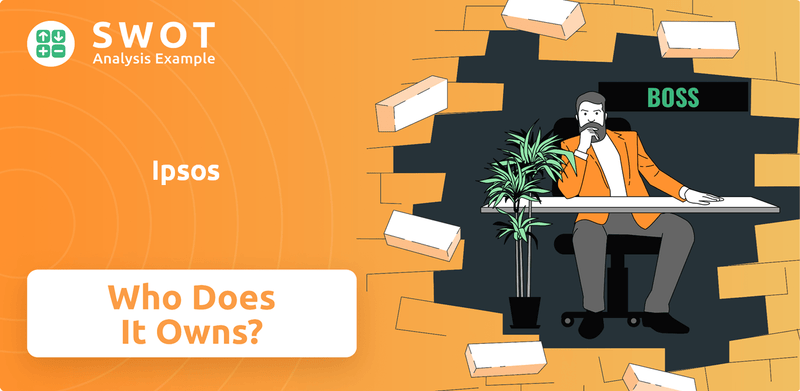
Founded in 1975, Ipsos's journey from a Paris-based startup to a global powerhouse is a fascinating study in corporate evolution. As of late 2023, Ipsos has solidified its position as the fourth-largest market research firm globally. This exploration will delve into the Ipsos SWOT Analysis, Ipsos ownership, Ipsos shareholders, and the influence of key players, offering a comprehensive view of the Ipsos company and its trajectory. Discovering who owns Ipsos, including Ipsos executives, is key to understanding its governance and strategic objectives, especially considering its public listing and the dynamics of its market position.
Who Founded Ipsos?
The story of Ipsos company began in 1975 in Paris, France. Didier Truchot established the firm with a clear vision: to collaborate closely with clients, offering tailored market research solutions. This early focus set the stage for Ipsos's future as a leading market research entity.
Truchot's experience at market research institutes like IFOP and ISOS significantly shaped his approach. He concentrated on providing services to advertising and media companies, developing innovative methods to gauge campaign effectiveness. This strategic focus helped Ipsos establish a strong foothold in the market.
The company's trajectory shifted when Jean-Marc Lech joined in 1982, becoming co-President. This partnership marked a pivotal moment as Ipsos expanded into public opinion research, a then-novel area in the French market. By the end of the 1980s, Ipsos had become the fifth-largest media research company in France, showing substantial growth and market penetration.
The initial ownership structure saw Didier Truchot and Jean-Marc Lech as the major shareholders. While specific equity splits at the start aren't publicly detailed, they retained a significant portion of the company. Baring Private Equity became an early investor in the 1990s. This investment was aimed at bolstering purchasing capital for European expansion. This early financial backing supported Ipsos's growth. For more insights, check out the Revenue Streams & Business Model of Ipsos.
- Didier Truchot founded Ipsos in 1975.
- Jean-Marc Lech joined in 1982, becoming co-President.
- Early focus was on market research for advertising and media companies.
- Baring Private Equity invested in the 1990s for European expansion.
Ipsos SWOT Analysis
- Complete SWOT Breakdown
- Fully Customizable
- Editable in Excel & Word
- Professional Formatting
- Investor-Ready Format
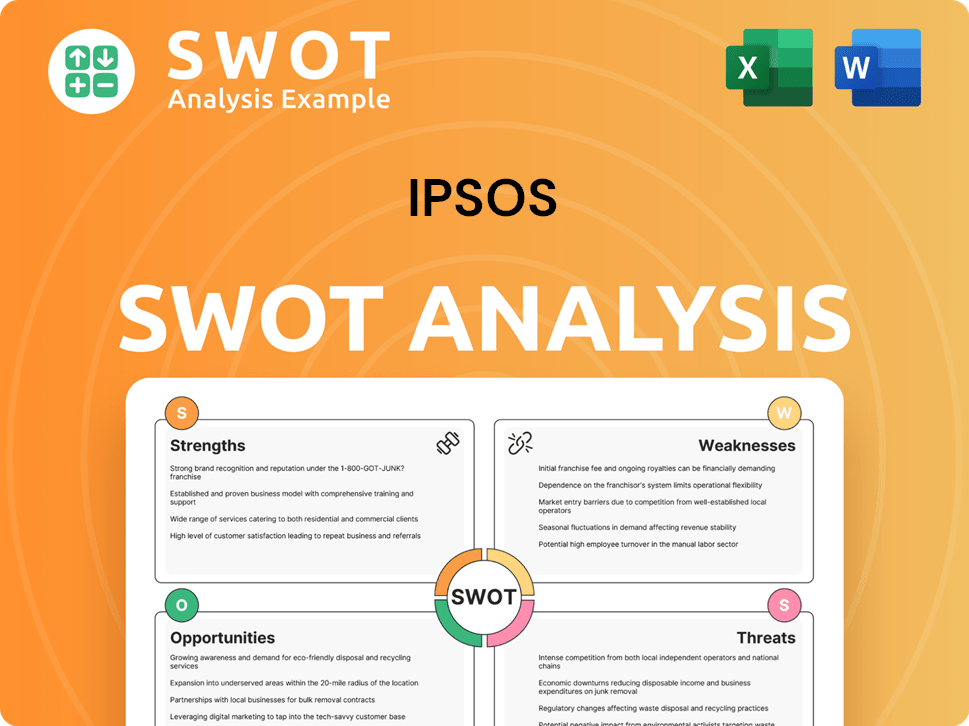
How Has Ipsos’s Ownership Changed Over Time?
The evolution of Ipsos's ownership has been marked by significant transitions since its inception. Initially a privately held entity, the company shifted to a publicly listed status, altering its ownership structure. This transformation began with the initial public offering (IPO) on the Paris Stock Exchange in 1999, which allowed early investors to realize their investments.
The early investors, like the Artemis Group and the Amstar investment fund, who had backed the company's global expansion, were able to cash out. This move set the stage for a more diverse shareholder base, including institutional and individual investors, which continues to shape the company's strategic direction and governance.
| Date | Event | Impact |
|---|---|---|
| 1999 | Initial Public Offering (IPO) | Allowed early investors to exit and broadened the shareholder base. |
| Mid-1990s | Investment by Artemis Group and Amstar | Supported global expansion and set stage for IPO. |
| May 17, 2025 | Institutional Ownership | Institutions hold approximately 44% of shares. |
As of May 17, 2025, the ownership structure of the Ipsos company
is primarily composed of institutional investors, who collectively hold around 44% of the shares. The general public holds a significant stake, with 37% ownership, while insiders own less than 1%. The major shareholders include DT & Partners, Bpifrance Participations SA, and Mawer Investment Management Ltd. These shifts in ownership reflect a move towards a more institutional investor base, which can influence company strategy and governance through their collective voting power. The company's development plans may alter this structure in the coming years.
The major shareholders of Ipsos
include institutional investors and key executives. DT & Partners, Didier Truchot, and Laurence Stoclet hold significant capital and voting rights. Bpifrance Participations SA and Mawer Investment Management Ltd. also have substantial holdings.
- DT & Partners held 11.42% of the capital as of December 30, 2024.
- Bpifrance Participations SA held 5.78% as of October 9, 2024.
- Mawer Investment Management Ltd. held 4.96% as of March 6, 2025.
- Norges Bank Investment Management held 3.66% as of June 29, 2024.
Ipsos PESTLE Analysis
- Covers All 6 PESTLE Categories
- No Research Needed – Save Hours of Work
- Built by Experts, Trusted by Consultants
- Instant Download, Ready to Use
- 100% Editable, Fully Customizable
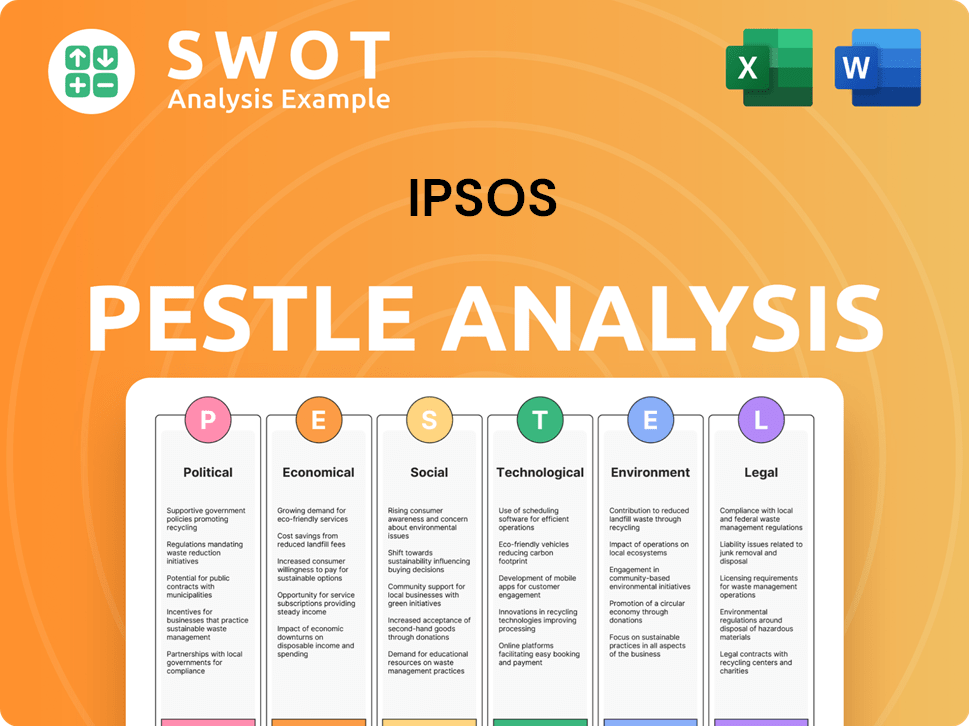
Who Sits on Ipsos’s Board?
The current board of directors of the Ipsos company plays a vital role in its governance, balancing the interests of major shareholders, founders, and independent members. While a comprehensive, real-time list of all board members and their specific representation for 2024-2025 is not fully available, it is known that Didier Truchot, the founder, remains the Chairman of the Ipsos Board, and Ben Page serves as the Chief Executive Officer. Ben Page also sits on Ipsos Partners' Supervisory Board. The Ipsos board has 13 active members.
The board's composition reflects a blend of experience and continuity, with a focus on maintaining stability and aligning with the company's long-term strategic goals. This structure is designed to ensure effective oversight and strategic direction, supporting Ipsos's position as a global leader in market research. The company's management team has an average tenure of 3 years, while the board's average tenure is 5.6 years.
| Board Member | Position | Additional Information |
|---|---|---|
| Didier Truchot | Chairman | Founder of Ipsos |
| Ben Page | CEO | Also on Ipsos Partners' Supervisory Board |
| Board Members | Active Members | Total of 13 members |
The voting structure of Ipsos SA is characterized by a significant concentration of voting rights in the hands of key entities, notably DT & Partners. As of June 11, 2024, DT & Partners held 11.4% of Ipsos SA's capital and 19.2% of its voting rights. When acting in concert with Didier Truchot and Laurence Stoclet, their combined stake represents 12.3% of the capital and 20.7% of the listed company's voting rights. This indicates a dual-class share structure or other arrangements that grant disproportionate voting power to certain shares held by the founding entities, ensuring their continued influence over the company's strategic direction.
The concentration of voting rights among key shareholders significantly influences Ipsos's strategic decisions and governance. The founders and related entities maintain considerable control, ensuring long-term strategic alignment.
- DT & Partners hold a significant portion of voting rights.
- Founders' influence is maintained through concentrated voting power.
- The company aims to maintain stability through professional shareholders.
- The company's focus is on maintaining governance stability.
Ipsos Business Model Canvas
- Complete 9-Block Business Model Canvas
- Effortlessly Communicate Your Business Strategy
- Investor-Ready BMC Format
- 100% Editable and Customizable
- Clear and Structured Layout
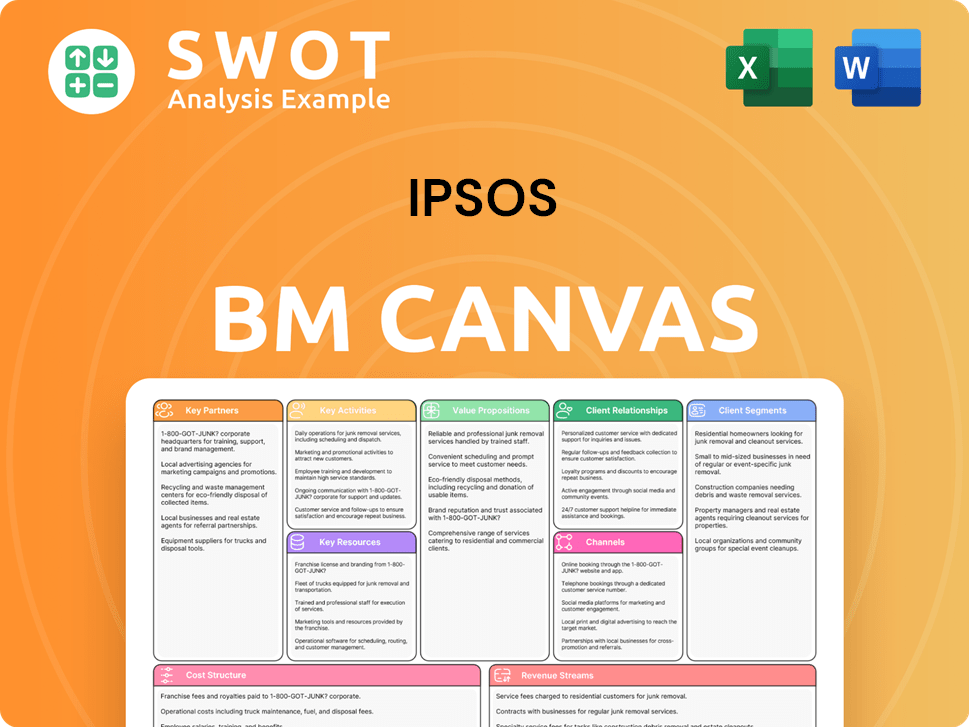
What Recent Changes Have Shaped Ipsos’s Ownership Landscape?
Over the past few years, several strategic initiatives have reshaped the ownership profile of the Ipsos company. A key aspect of this has been its acquisition strategy. In 2024, Ipsos made notable investments, including I&O in the Netherlands, Jarmany in the UK, and Crownit in India. Furthermore, in August 2024, a voluntary public takeover offer was launched for Infas Holding AG, with significant support from Infas' main shareholders. In March 2025, Ipsos entered exclusive negotiations to acquire The BVA Family, demonstrating a trend of consolidation in the market research industry. These moves have strengthened Ipsos' global leadership, particularly in public affairs and data analytics.
A significant development was the 'Ipsos Partnership 2024' operation, where executives invested approximately 18 million euros into Ipsos Partners. This allowed Ipsos Partners to buy back shares and increase its stake in DT & Partners, the reference shareholder. Following these operations, Ipsos Partners holds 21% of DT & Partners' capital, and DT & Partners now holds 11.4% of Ipsos SA's capital and 19.2% of its voting rights. This initiative aims to align executive interests with the company's long-term goals. In September 2024, the Lac1 fund, managed by Bpifrance, became a major long-term shareholder, reflecting confidence in Ipsos' growth potential. Institutional ownership reached approximately 44% of Ipsos shares by May 17, 2025. Additionally, an equity buyback program for 4,320,323 shares, representing 10% for €300 million, was announced in May 2024, indicating a strategy to return value to shareholders.
Ben Page became CEO in November 2021, succeeding founder Didier Truchot, who remains Chairman. The company is currently undergoing a new strategic review, 'Horizons 2030,' with conclusions expected before summer 2025. This review may lead to further changes in ownership or strategic directions. Understanding the Marketing Strategy of Ipsos can provide further insights into the company's direction.
Ipsos' ownership involves a mix of institutional investors, executive stakeholders, and DT & Partners. DT & Partners holds a significant portion of the voting rights. The company's structure also includes a buyback program to manage its share capital.
Major shareholders include DT & Partners and institutional investors. The Lac1 fund managed by Bpifrance also holds a significant stake. Ipsos Partners, the investment entity for executives, is another key player.
The equity buyback program for 4,320,323 shares, representing 10% for €300 million, was authorized in May 2024. This demonstrates a commitment to returning value to shareholders. These financial moves can affect the Ipsos company stock price.
The 'Horizons 2030' strategic review, with conclusions expected before summer 2025, may influence future ownership changes. The company's acquisitions and strategic partnerships also play a key role in its future.
Ipsos Porter's Five Forces Analysis
- Covers All 5 Competitive Forces in Detail
- Structured for Consultants, Students, and Founders
- 100% Editable in Microsoft Word & Excel
- Instant Digital Download – Use Immediately
- Compatible with Mac & PC – Fully Unlocked
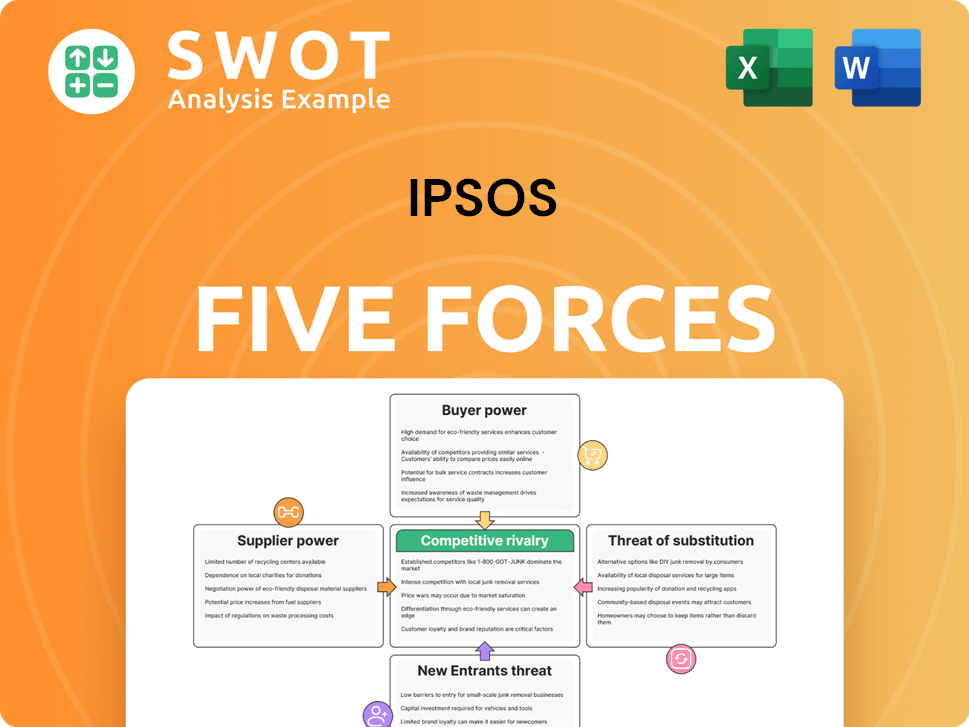
Related Blogs
- What are Mission Vision & Core Values of Ipsos Company?
- What is Competitive Landscape of Ipsos Company?
- What is Growth Strategy and Future Prospects of Ipsos Company?
- How Does Ipsos Company Work?
- What is Sales and Marketing Strategy of Ipsos Company?
- What is Brief History of Ipsos Company?
- What is Customer Demographics and Target Market of Ipsos Company?
Disclaimer
All information, articles, and product details provided on this website are for general informational and educational purposes only. We do not claim any ownership over, nor do we intend to infringe upon, any trademarks, copyrights, logos, brand names, or other intellectual property mentioned or depicted on this site. Such intellectual property remains the property of its respective owners, and any references here are made solely for identification or informational purposes, without implying any affiliation, endorsement, or partnership.
We make no representations or warranties, express or implied, regarding the accuracy, completeness, or suitability of any content or products presented. Nothing on this website should be construed as legal, tax, investment, financial, medical, or other professional advice. In addition, no part of this site—including articles or product references—constitutes a solicitation, recommendation, endorsement, advertisement, or offer to buy or sell any securities, franchises, or other financial instruments, particularly in jurisdictions where such activity would be unlawful.
All content is of a general nature and may not address the specific circumstances of any individual or entity. It is not a substitute for professional advice or services. Any actions you take based on the information provided here are strictly at your own risk. You accept full responsibility for any decisions or outcomes arising from your use of this website and agree to release us from any liability in connection with your use of, or reliance upon, the content or products found herein.